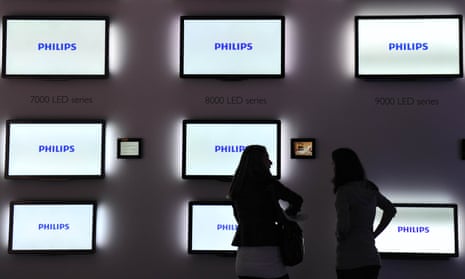The Dutch electronics firm Philips has warned it may shift production out of Britain in the event of a “hard” Brexit, saying it was “deeply concerned about competitiveness” of its operations there.
The Amsterdam-based group employs about 1,500 people in Britain, most notably at its factory at Glemsford in Suffolk making baby care products for export.
“I am deeply concerned about the competitiveness of our operations in the UK, especially our manufacturing operations,” said the Philips chief executive, Frans van Houten.
“We estimate that the cost of the exported products will increase substantially under any scenario that is not maintaining the single customs union.”
Any changes in current free trade agreements, the single customs union and current EU product certifications “is a serious threat to the competitiveness of this factory,” Van Houten added, saying: “We need to do worst case scenario planning.”
Philips is the latest company in a chorus of major industrial players – which also includes Jaguar Land Rover, BMW and Airbus – to warn about the negative impact of an acrimonious split between the UK and EU.
“At the moment, we are considering all scenarios, including one in which there is a so-called ‘hard Brexit’,” said Philips spokesman Steve Klink. “In that case, it could include the departure of our manufacturing for export.”
But Van Houten said: “Philips remains absolutely committed to its current and prospective future customers in the country” including hospitals.
Theresa May on Friday persuaded her Eurosceptic ministers to back a plan for closer trade ties with the EU after Brexit. After marathon talks at Chequers, May’s divided cabinet agreed on a new “free trade area” where Britain would accept EU rules for goods.
But the prime minister still has to sell the plan to Brussels, which could keep Britain tied to the bloc for years after Brexit, even if officials stress parliament would reserve the right to diverge.
“We are faced with the continued unclarity and uncertainty of Brexit,” said Van Houten on Sunday. “Europe is at risk of falling behind the US and China, as they move ahead focused on strengthening their geo-economic leadership,” he said.
- The image on this article was changed on 9 July 2018 to replace an image that misidentified the Philips CEO Frans van Houten.
